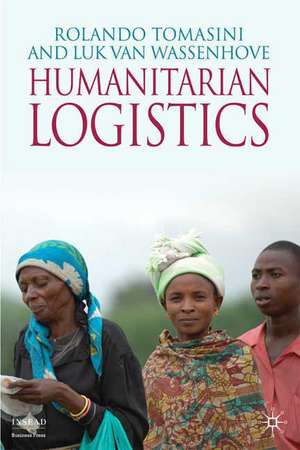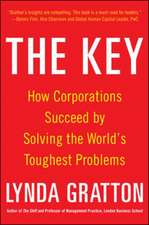Humanitarian Logistics: INSEAD Business Press
Autor R. Tomasini, L. Van Wassenhove, Kenneth A. Loparoen Limba Engleză Hardback – 19 feb 2009
| Toate formatele și edițiile | Preț | Express |
|---|---|---|
| Paperback (1) | 448.76 lei 6-8 săpt. | |
| Palgrave Macmillan UK – 19 feb 2009 | 448.76 lei 6-8 săpt. | |
| Hardback (1) | 489.30 lei 6-8 săpt. | |
| Palgrave Macmillan UK – 19 feb 2009 | 489.30 lei 6-8 săpt. |
Din seria INSEAD Business Press
-
 Preț: 355.70 lei
Preț: 355.70 lei -
 Preț: 229.59 lei
Preț: 229.59 lei -
 Preț: 383.93 lei
Preț: 383.93 lei - 15%
 Preț: 511.52 lei
Preț: 511.52 lei -
 Preț: 387.38 lei
Preț: 387.38 lei - 5%
 Preț: 373.84 lei
Preț: 373.84 lei -
 Preț: 392.60 lei
Preț: 392.60 lei -
 Preț: 493.12 lei
Preț: 493.12 lei - 15%
 Preț: 480.52 lei
Preț: 480.52 lei -
 Preț: 386.81 lei
Preț: 386.81 lei - 15%
 Preț: 503.83 lei
Preț: 503.83 lei -
 Preț: 387.96 lei
Preț: 387.96 lei -
 Preț: 392.75 lei
Preț: 392.75 lei -
 Preț: 386.81 lei
Preț: 386.81 lei -
 Preț: 396.40 lei
Preț: 396.40 lei -
 Preț: 419.81 lei
Preț: 419.81 lei -
 Preț: 358.40 lei
Preț: 358.40 lei - 15%
 Preț: 585.08 lei
Preț: 585.08 lei
Preț: 489.30 lei
Nou
Puncte Express: 734
Preț estimativ în valută:
93.63€ • 98.02$ • 77.47£
93.63€ • 98.02$ • 77.47£
Carte tipărită la comandă
Livrare economică 05-19 aprilie
Preluare comenzi: 021 569.72.76
Specificații
ISBN-13: 9780230205758
ISBN-10: 0230205755
Pagini: 178
Ilustrații: XIII, 178 p.
Dimensiuni: 155 x 235 x 18 mm
Greutate: 0.45 kg
Ediția:2009
Editura: Palgrave Macmillan UK
Colecția Palgrave Macmillan
Seria INSEAD Business Press
Locul publicării:London, United Kingdom
ISBN-10: 0230205755
Pagini: 178
Ilustrații: XIII, 178 p.
Dimensiuni: 155 x 235 x 18 mm
Greutate: 0.45 kg
Ediția:2009
Editura: Palgrave Macmillan UK
Colecția Palgrave Macmillan
Seria INSEAD Business Press
Locul publicării:London, United Kingdom
Cuprins
PROLOGUE Chapter 1: LOGISTICS OF HUMANITARIAN AID • Introduction • From Logistics to Supply Chain Management • Supply Chain Management • Supply Chain Management Fundamentals: Flows, Design, and Management Quality • Characteristics of a Humanitarian Supply Chain • Speed • Opportunities for Cross-Learning • Sharing Knowledge Between the Private and Humanitarian Sector • Conclusion Chapter 2: HUMANITARIANISM • Introduction • Not All that Glitters is Gold • Defining 'Humanitarian' • Humanitarian Space • Conflict Connection • The Humanitarian Challenge • Conclusion Chapter 3: PREPAREDNESS • Introduction • Hurricane Mitch • Successful Responses are not Improvised • Preparedness Challenges • Logistics Becomes a Central Function from Hurricane Mitch to Gujarat • Five Key Building Blocks of Preparedness • Preparedness Strategy Drives Response Effectiveness • Put an End to Fire-Fighting • Conclusion Chapter 4: COORDINATION • Introduction • The Need for Coordination • Levels of Coordination • Disaster Lifecycle • Matching the Lifecycle • Humanitarian Coordination: Obstacles to Overcome • Conclusion Chapter 5: INFORMATION MANAGEMENT • Introduction • Role of Information Management • Visibility (Pipeline) • Transparency (Process) • Accountability (Parties/Performance) • Benefits of Accountability • Information Flows • Conclusion Chapter 6: KNOWLEDGE MANAGEMENT • Introduction • How is Knowledge Created? • Knowledge is Created and Needed at Different Levels • Knowing Ahead of Time • They Know That You Don't Know What They Know … And It Will Cost You • Barriers to Knowledge Sharing • Conclusion Chapter 7: BUILDING A SUCCESSFUL PARTNERSHIP • Introduction • Humanitarian-Private Partnerships • Building Learning Labs • Back Office Support • Humanitarians in the Forefront • Forms of Corporate Support for Humanitarian Activities • CSR Partnership Challenges • Investing in Partnerships: The TNT-WFP Case • Value Through Learning • Learning: A Difficult Process that Needs to be Managed Proactively • Barriers to Exchange Best Practice • Conclusion EPILOGUE
Recenzii
"This book is a great example of our commitment at INSEAD to develop responsible leaders. It is very timely given the rapidly increasing acknowledgement of the importance of the social impact of organizations. The cases and recommendations in this book will be very helpful to anyone seeking to maximize their impact on humanitarian disaster relief." - Dean Frank Brown, INSEAD
"As the UN's lead logistics organization we have a responsibility to look for benchmark practices both in the traditional humanitarian community but also in the private sector. The partnership with TNT has allowed us to do just that. Humanitarian logistics are very different from private sector logistics, but we can learn a great deal from each other, as this book amply demonstrates." - Josette Sheeran, Executive Director at World Food Program
"Since 2002 we support WFP with our core competences to develop supply chain solutions; moreover we acknowledge the importance of logistics in disasterrelief and the role the private sector can play in this field. This book gives an insight of the importance of humanitarian logistics and the challenges that lie ahead." - Peter Bakker, TNT Chief Executive Officer
"I highly recommend to humanitarian logistics professionals as well as business supply chain practitioners. This is the first book that has integrated effective approaches in humanitarian logistics and business supply chain management in a most instructive and inspiring manner, and both sectors can learn so much from it." - Hau Lee, Thoma Professor, Graduate School of Business, Stanford University.
"As the UN's lead logistics organization we have a responsibility to look for benchmark practices both in the traditional humanitarian community but also in the private sector. The partnership with TNT has allowed us to do just that. Humanitarian logistics are very different from private sector logistics, but we can learn a great deal from each other, as this book amply demonstrates." - Josette Sheeran, Executive Director at World Food Program
"Since 2002 we support WFP with our core competences to develop supply chain solutions; moreover we acknowledge the importance of logistics in disasterrelief and the role the private sector can play in this field. This book gives an insight of the importance of humanitarian logistics and the challenges that lie ahead." - Peter Bakker, TNT Chief Executive Officer
"I highly recommend to humanitarian logistics professionals as well as business supply chain practitioners. This is the first book that has integrated effective approaches in humanitarian logistics and business supply chain management in a most instructive and inspiring manner, and both sectors can learn so much from it." - Hau Lee, Thoma Professor, Graduate School of Business, Stanford University.
Notă biografică
'This book is a great example of our commitment at INSEAD to develop responsible leaders. It is very timely given the rapidly increasing acknowledgement of the importance of the social impact of organizations. The cases and recommendations in this book will be very helpful to anyone seeking to maximize their impact on humanitarian disaster relief.' - Dean Frank Brown, INSEAD'As the UN's lead logistics organization we have a responsibility to look for benchmark practices both in the traditional humanitarian community but also in the private sector. The partnership with TNT has allowed us to do just that. Humanitarian logistics are very different from private sector logistics, but we can learn a great deal from each other, as this book amply demonstrates.'- Josette Sheeran, Executive Director at World Food Program'Since 2002 we support WFP with our core competences to develop supply chain solutions; moreover we acknowledge the importance of logistics in disaster relief and the role the private sector can play in this field. This book gives an insight of the importance of humanitarian logistics and the challenges that lie ahead.' - Peter Bakker, TNT Chief Executive Officer'I highly recommend to humanitarian logistics professionals as well as business supply chain practitioners. This is the first book that has integrated effective approaches in humanitarian logistics and business supply chain management in a most instructive and inspiring manner, and both sectors can learn so much from it.' - Hau Lee, Thoma Professor, Graduate School of Business, Stanford University.













